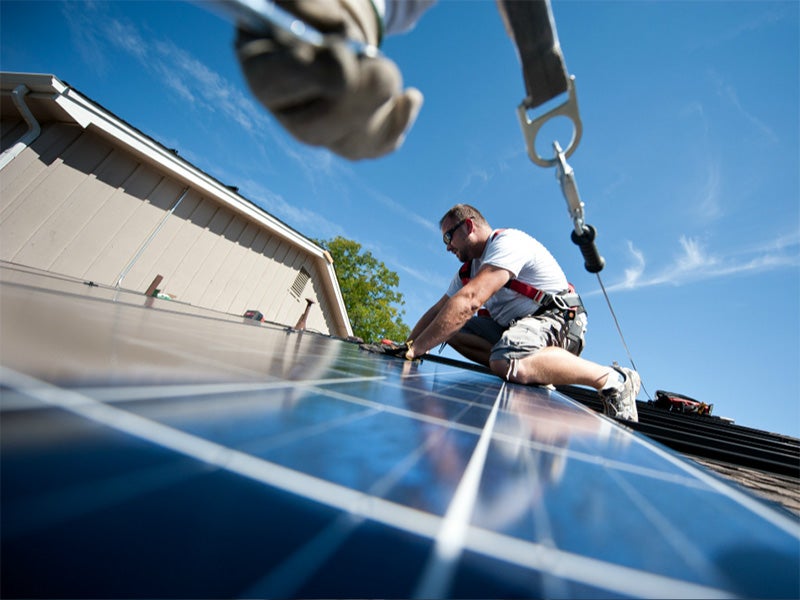Revolt Against Clean Energy Sweeps Nation
Fossil fuel industry seeks to protect bottom line by quashing solar growth.

This page was published 12 years ago. Find the latest on Earthjustice’s work.
(Clarification: This column references a letter by California Public Utilities Commissioner Mark Ferron, who said public utilities would likely “strangle” rooftop solar if they could. In a separate part of the letter, he blamed the fossil fuel industry for preventing a national policy on climate change and energy, which as the column points out, is evidenced by the industry’s national attack on distributed energy sources like rooftop solar.)
Last month, departing California Public Utilities Commissioner Mark Ferron sounded the alarm on an anti-clean energy trend gathering momentum across the U.S.
In a sharply worded letter to the commission, which regulates all of the state’s privately owned electric and gas utilities, he warned that The fossil fuel industry public utilities would likely “strangle” the growth of rooftop solar energy if they could. Ferron advised his colleagues to avoid putting the interests of utilities over those of the public. He was referring to a growing war on solar being waged by utilities across the nation fearful of the threat to their basic business model.
From California to Colorado to North Carolina and other states, many generators of centralized fossil fuel energy are trying to prevent individual Americans from producing clean, renewable solar energy on their own roof tops. They would deny us the opportunity to participate in the greater goal of shifting away from polluting, climate-altering fossil fuels.
There is a simple reason for the utilities’ action: They fear losing their monopoly hold on revenue from power production.
Rooftop solar is a game changer that lets consumers generate their own power, reducing the need for a centralized power system and cutting to the heart of the utilities’ comfortable position of a guaranteed return. For more than 100 years, power companies have profited from a centralized energy model that distributes power from a fossil-fuel burning power plant out to users through a grid of power lines.
Rooftop solar transforms the system by letting residents and business owners generate their own energy and send extra energy to the grid to power their neighbors’ homes and businesses. It allows us to exercise greater control over how much energy we use and from where it comes. People with rooftop solar save on their energy bills, they offer clean energy to others around them, and they reduce demand on the overall power system. They also save communities the risks and costs that come with fossil fuels: climate change, toxic air pollution, water pollution, stresses on community drinking water supplies and more.
Customers who send extra clean energy from their homes and businesses to the grid provide significant value and should be fairly compensated; but instead, utilities seek to penalize them in an effort to make this increasingly cost-effective resource appear uneconomic. Legislation is proposed in 25 states to limit, tax or fine rooftop solar and net metering, the billing arrangement that allows rooftop solar customers to get credit for providing energy to the grid.
Further, in their portfolio planning, utilities are deliberately undervaluing the benefits and overvaluing the costs of rooftop solar. Much of this is an orchestrated campaign by corporate lobby group American Legislative Exchange Council (ALEC) to promote legislation that encourages continued fossil fuel use and discourages competition from renewable energy sources. The Guardian reported that ALEC sponsored at least 77 anti-clean energy bills in 34 states in 2012.
In the face of this powerful, well-funded campaign, the individual consumer gets small comfort from government. Congress has utterly failed to address the issue with national policy, and there is weak oversight at the state level, even in California, which is considered a national leader in clean energy development. Ferron noted that California’s PUC has been much more attentive to utilities’ concerns than to innovative clean energy policies.
Earthjustice is defending against the war on solar with the goal of advancing a transition to clean energy. For example, after months of legal advocacy before Hawaiʻi’s public utilities commission, we and our allies forged an agreement with electric utilities to greatly increase the number of rooftop solar systems connected to the grid. This should pave the way towards weaning that sunshine-soaked state from its 90-percent reliance on fossil-fueled energy generation.
In California, we helped bring about a groundbreaking decision to build innovative high-tech energy storage systems to lessen the state’s dependence on fossil fuels and expand the capacity of the grid to absorb the state’s rapidly expanding solar use. And in Colorado, we are in court defending against an industry attack on the state’s far-reaching renewable energy standard.
We’re not going to stand for inaction in the nation’s capital or for utility industry attacks in the states. We seek an energy grid that is open to the public, so that Americans can participate in and benefit from ending our reliance on fossil fuels and delivering clean energy. We’re fighting towards that goal one roof at a time.